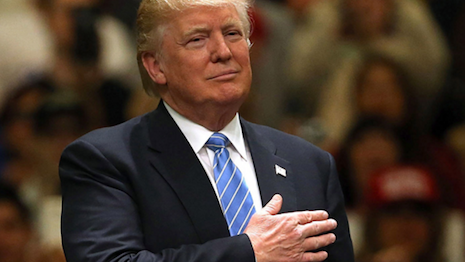By Livia Stefanini
The Trump victory and ascendancy to the highest office in the United States has thrown fashion and luxury brands into a tizzy – not surprising given that they had overwhelming thrown their weight behind Hillary Clinton.
So how should these sectors react to Donald Trump and the fallout from his policies once he is in the White House? Here are three factors to consider.
1. The return of decadence?
Post-recessionary fashion coming out of 2008’s global crisis replaced extreme luxury with a more subdued approach to high fashion. Premium overtook glossy, golden luxury.
However, over the past few years, as furs, exotic skins and statement jewelry made their comeback, the fashion world began to re-embrace conspicuous luxury while supporting altruistic purpose and understated aesthetic.
Will these two extremes continue to co-exist, or will the king of glossy golden luxury, United States President-elect Donald Trump and his soon-to-be First Lady wife Melania Trump usher in an era of decadence?
Sporting a $4,000 Ralph Lauren Jumpsuit, for her husband’s victory speech in the early morning hours of Wednesday, Nov. 9, Ms. Trump already sent a clear message that she will not be playing the High-street fashion game a la Michelle Obama or Catherine, Duchess of Cambridge.
2. Connecting with a divided customer
Choosing Mr. Trump or Hillary Clinton was not dictated by voters’ salary or income – not as much as expected or we saw with Brexit.
Education, race and gender played their role, but ultimately the division is deeply ideological.
Although former Secretary of State Clinton won the popular vote, the margin is extremely narrow.
For every one American who voted Clinton, one voted Trump.
Where will U.S. brands and retailers stand in a nation with such a 50/50 ideological divide? Should they join the conversation – as did Vogue, Stonecold Fox and Reformation, or remain mum such as J.Crew, Shopbop or Nordstrom?
While brands with a core customer following in seaboard states could afford to actively support Ms. Clinton during the election, how will they respond in the next few months?
Alternatively, how will mass brands with a strong following in red states engage with their consumers, who are celebrating the election results, without alienating Clinton supporters who are angry, disillusioned and fearful of a Trump presidency?
3. Americana backlash
Leaders around the world – excluding Russia’s Vladimir Putin and Israel’s Binyamin Netanyahu, among others – have expressed their dismay for Mr. Trump’s victory with chilled congratulatory messages riddled with subtext.
But how will foreign consumers react to American brands with strong Americana narratives. Will there be an American “brandlash”?
Particularly in Central and South America, where people have been personally offended by Mr. Trump’s comments?
Latin America, according to the Business Insider, follows Asia-Pacific as the fastest-growing region for ecommerce, and Mexico is the second largest market for ecommerce in Latin America.
THAT SAID, to mitigate the potential negative implications of a Trump presidency, U.S. brands should start analysing ways to de-Americanize their appeal or soften their Americana image and build stronger ties with foreign communities to earn their trust and respect.
 Livia Stefanini is strategy director at Havas LuxHub
Livia Stefanini is strategy director at Havas LuxHub
Livia Stefanini is strategy director at Havas LuxHub, London. Reach her at [email protected].
{"ct":"4vnddrIzB\/E3m4QmfAGnk91LVYeoqMxGn9FUXSsYyVF2FXp6DIRejwu+X\/Vg7kEjsJBBpoTjRjYkGvlXJS4EucybYNLvNfB9y6Z82750R9K3dAPC7VPFF5WIOs6awgk0EIU9AYLK+I\/cVMrRCDKphDa2aaCkM3hdSxyx6RePxJmVZK0hI92A7plIZaj+wLgkVaQlgvBIePAP+yblcVAC5lqC5rGk\/RLVxUYSRxjd+udrRv6DVCaZE4fkccDU1BxoGv7RVdlGKYKStTa9px05NY2DqtnFtq74qyF4BWDAjc+PLTjMqaCtzMfoO75YsaG\/d0d7pvZfquFfTDJUijaWfrT9ALAViXb9czPasWDkLubgxBN0M4VQtGNJWkv5Jdxi4KrhUtWWK+k1xbzyrvd9ApoSC9p3WbYE1TH4xGBiL3kR2PqV6Ycd7LfIC5bCpoVFrUBXkP1gMvu5eybK\/0cy1K84gr1E5BA+NP9qP91NtUANMuBBSZkqeTaEXvb5IIljeMdYzK1XL63VTI3XNgPa8Pi51HtDya7NwQR7v\/7Q2GUhBBsMYOPzAMI6Hwv3vFt\/xDn2fGq6KT76H1NXavX8kWer31KQ6lOt4Ft8KQbt8nCvwaTkr1B+GA\/5aRva9f7iePVz3nXtSjr1XSxBDaaLoGUKi0CNGSbN5N2LW3v4\/c0wGFR8beTFFNpw4ZqrmeeWWidRxgxZUw0D9lM1V3qj+0Wf0oU2kJlH65vC6NlHudU0iFPMhz8s2ard4DEKwf47vXdw4B7h6Mzzyc7ytRhPtI4cgSYhTfuemHznOk98T3TPNTsQdXilvAw+0pAZATPWBkCcxVF8\/ktxjgreUdNQEQ3UgSxJ\/QBFphjpHxkqmy9OsgzcotLHdod7B+gp99\/8jmjYMd450c37kvO3unuM5Lh08X\/+DHETiXko\/uo3+oOaLnZFKot27GHmJr5wHC243o01WAzQNkO1FgYgxVE1R5zyoU7\/ZWVE7L9s0GEZ4ixLveKciFg7\/0Mnz0RNQ4EN\/cLBpWcgv9gHULz+icsZvruYV+VsM51JkomRsWyjt8Uv3\/hF\/m0oiJdHFF15eZOgP0aucxdGYHaGCMI\/kc4b\/FoMAU0H0aFluCnfhQw\/pnL\/NIh+mqUrBBtR1HjYJtrS9XDNPofevnw5LLrVRTCoeYo73PzLW9JFy6mzQpvwSAii1hSlIKeG8pyoBzcVYOaH3DAN4xJ+YSWqX\/HP+0D4Dzk3f3JuePG+fjIvLhW0Gh879XRmMPYZXa\/tgy2dRJGsMpJWIcGygMprHt2fGB\/1Od8PmeIiZXofYFbD3XHs0oTWjEGE268IenADovwuuWt+Nuy+eMbYAiHOZvN7jW9fiUN9YxJao6i0dSH7acKzaz40e50cxyM9ShEMSi9elxDIU3cCodrmKbeILJSEviB38gKk9a502+o7uAtiSrNZJp4rOWQG2C+8jeW1DE9Z2n9fRyhwbfZjoKdNE9Nte1WUZlt7\/Si1NYgA7o44YANTWBotqlqVldu1O7eg77BLMsFwsoI0TJnoVMk0MfweVPN6giYnZHp8sJAHaoPGivPoxEjq+c0pEeEx72tsFMG0cIDnQjx0QeZtgDbxChymGvpFfRousMCdpC3GDQndAjZy\/x8n4\/zaAkwYGj6bGElXdg2J0mHHPUDQgh4qZJ+ODzXl8HjQv50oo+mPfbVVrRWvEuFML8nRZR4eiUu2w5mD7Ej7HqKG5p0EPWqRI5IW1INxPNXoX4DYza8QBuXLxUl6DMGu5hQ1fIWUNzAYpSyjVe0uCXWBE9Dj6AtWPDl0SSkCRFNWthrGJofH66XNfw3kih\/BK8M+HgWzf0fTIG3akZCRl+hqiHIeKxVItzV6klJdCBvOC9sDHTNvBGwWLB2ALdVU+txrXrfzNYZ0HbooQYLejednK6ZpkP9RvwfTedbYTN8rSul9Cy\/OHmt1HjQiQHzdL7u2SkK7\/gqiJVrbv2KRPpQs0xtVkn8CoOieCN2KR2uBJaVu+GM2q4Gw3q0RSi+AKMtJ5GB3A2t0al2J8jCI3CZZs7IttxYbtnUZz2\/aFPrK0HTBj5Q4fqC1xtZ3LO4GkyD4LLgrSClru3fmFneE8jJrTpw3wZRUehXbKtAIotcbzYUWAw5FPNxWbaOtwC6RXAgOE9E5Ag7CXqcgd4V06sYRkPbl+\/OJqHdvLd1o5StBo2xosemrl43XS87ApSIXVHxWS8GprxbQLPPExPYJk4TAj+V5cuBoLWG+gwKfXVTrohXrTEtLixLwueEu\/iSvrLxJflyxlEpIKntHX5TDDZwFvEioOWcECHqD1h+RIiSxScqiKImIzslWUyLFZmYIU\/69mZwi\/yl5KwKIsHR5bwDKP4Is\/JaWmLXuaJTSCxRYz+r2BxpSWEXvv7JvQSYY2gZit5LFOxZU9p\/HALek96gSVUhfN75j03a1PQ5kWENsYwe0t60Db1BzTHwZLC+85SDSBHOOL1W3FeKpUzoxmZU6nkzvN5ZxGjzdf7\/PyFQAy3NDLRanbrB+a94D+WwEtdCM9VD1+xNkvvWaWWkzoopZ2V1+5fadIxVHM067L7tpf8jR4YtzXUK4+voVE7CoVslSfqn+3+d7hqyP1DM57RHADUj8KJqEFMLU\/A\/t7H6IiTaVbjGG+sNS7Q\/fwYIMf3E8lfDnlCKCfGT+5DP3i\/4w4QH71d1S\/PYtRy6K8Qcn2gMslmeehOZ9LbVVgvVqweobKLh4of+8kchL3T7c6VFU57rNzmmEZjOXv6yXhdzAP6KU5hlffsS6x1fyd+44OVJlEfeIxZAxJLSNa1IGTlWarFh7bAMV4rf71wiMLAEAemQGhUFJzGc5Q5J1f8l5tfNkp9zKV1bvohUqH5sXDs4galdPv76oej+VdjWxCtnuXV+X0CwA9zPO25dqel5MmTdVbM3BxvyjIRSkgNbw6a5q5oWxlqkdh1WzotJrShbwVoX40O671ptPgElPYR7CmdqIN1TBwHipqUARExAtbJRngzJrEnUdW\/JnM6mJ4o5Vdpr68rXOTZn0W4kcvJVwiQQZ3xDAcXWb+KRto8aDPvOASM3GerHfDzi\/3FOjEeo15Kl6h\/TEJlYkaNVEwJnxElRX+G8hKHpATt6eXa83dnrxc2PhvGGHAJuNBXQaH2gOjCNwHCYsTTXG9GTadkHp4Boc8qPS8GemmyxFp1AkMg5EpBpTrspTNXRldA26L0rLviFUthQPosO8PDaxjVyG8J2t+lkxciR6SwodT2k\/3btUvhIkww9135BQjEWdK+lj1pohIcaEKzXTxZstiWjF+57e17vKaESGz+7JJrtQor3yP1dk9RYa0YETVeTeq\/ot5XMaW6E4jRJzmEC999RyPqtDYLW4Co2WxmfAA9SlsjbcDQ4hVMb5t0A\/kZddEkuVQDAq4v4W1tcdTaSx+k8ub9w\/yBqHg\/OM\/FHKGbP2SgYH3aXJOMo+M3RJgT32Dyf+zOj9ZA+pjGt+t1uvC3lKaawB1KDXCFiiOkfDlAjt72HYMzyyZG2P3I5EojbKYaYAhDLQ9w0nGt9h1IKNVT9vWmgq4ilY2QBeTxsrNKMESKNMt66RSn70Vwg02FYJAob1LCMLVGB\/6I6ZDQuwTRSUB99ZawDjBt0g3qFQ5E3SF0a2nCY2r1CryCINJZilxSjTz+WsIJpmDNa8UVyydKM3xPUcEvrCeMu4JtJ93nQGbjYJqMuif07iwuuMYFhnG69\/x+Mur16JvBXdFYty4xqdOUy6hkP77CPBAZFNxsvHkd7aW48BM+G3D0tSkQJIdfLyF8i1EZSN4bDKQDUSqi0krVNxW621dQCsZF2rVmbdmJSrbOH2PHhYrw31nfxvLoVbrydXdLZSYxoHIkWgY5+liQccvIyaTejZQS7kvvFcsFobgeZ0By3kLapSzcv3smeWn9N+FkV8KsWS3GtdgRrlbWgglZmPrsA82g3voJHMuhB6e9EHSOj2kgLBE1uJvt\/H8y5r6A7UKjYa6W5A8ZfpDx+RNSl7jI3k7uoyuh3vCFeg8hCtbPA3C8Tdu3lZ\/FUO5D5b0NRk1O\/r5il5hKZ\/ma4eVOSTtoJzwPyeJT0An\/MDN657Wsqj5nN7qKT\/+1oeRbl2yb9\/2nRqb9CVLlEoHAwUjLw\/iYxhKiMxt1bBpZRqfhr85vfAVDRmmc7ZXrmNi+8COh8E6IhomYaOZW6F9nEb6Hnl12ur6EEGo3oPu21nXGGONhPzKxjx6YUzfV+0g4YvRQ2FULwILciagzrDvydyBrPB0SNOTg3cQXWdXhrSzOs8q5fI4VfdsgVpHvHAGuGYeeQpwEUAVTC4XFh1k4vq1Lyl1a0czD4M8Lm1LkrSxViS\/fVlSggGlWGFLCUQD5hEMkeSmNVobtNSSKmoMDBymYLaI3p\/r4XTJD7H+jHdfCxgwv0WYFmh3vrtPsclhW2qL4wFAC5rpdOhAW2OEKprQhsG4Coiu474aWxcfxI8+PfEAPfOHZBJuzj4cpRGrMcB2aBTDZ58XXb78FkzC+Rf5S+kEPioaJFRcK2\/U8ohMtWqGMFn0SbJcOcbKvQ\/MWAcJTve3IvPTWdfgRGV\/0\/xfJQMzvArx+ppOp4qCDsA3sj71f2LWd3cdgq4qYy2p6gd5nV9Kwjk4EbhXaMxcSOpHltTceRwgK0M8X\/5Y0xsFCDpDwZpRWVECOBOl2vtAVWl3X9WVb8oyTAzNFKigfUfqnFeTjoN8FyErZPouDo2i+57Xz9CLMtkSzuqve9T5XkSYDRcNVbSDs\/nUoy0yyQLyReglseREXdhdFZg0jUPl+5YVOZAKBjxdPL7+6qM2Lejh3F7bRHxf5ydaWNfSCJXa6G4GqjGNLk64PvLMANACdKGw\/22IYjaOqacjMfV+gwOLHbU0roMc\/EfigwD6s\/8HU58L34KEHl6BoH2ZCd4n2+q3UUB7zx6x8bgCcJ5+OhbptwzvrMLKrkTtSjQdAjfbVJiqjF4+ThiZM7rPHWSCfhRfGoZddvTP\/muSE36elj4LudQh4HicR7gy7xQmraTMFWhVx2rgI8n5zzugRPcEjXf+VsyO+ycmptrrKwfceiatr5lYVwXSEUUn8HHyMcHQoSKL9Jqe8ai5kPGHvsQ5670AB6Z9LPQxSd0I29k4OrQ07R8xaGtfqpmVDk5dZ6BHJL\/IZgvqawTX28fEqp3Fut7X4tbKommztikwB87h2SvidyH1tpGwCW+IMxvTOPFgsFyWlxBigWeZOHTMMkKXYoYq4tN3gm8XfMdf\/g927ROIjvwsv8hJz1az0XY10TScQR8rhdyiwwWRMsWmfIyRCZdWf\/87uvZBeQ5MQXE3umyyGtWlVsJQV9mkTNP2vkjZ1HaQSZ5N1IQRcu6lVvEIfMNkj3UOxWajBric0rtEXTuS6YJstAPzG3CzC4XaI4dLlYMCz2\/m5DADWVukjs+LGRpguxAnc+H+RcMW0N+tAVeTF9H9jVew\/QGsQq0bDWX5jcb8VHWqt9H\/YIxsyDWcRYiv1TWpRQmagM9+Ikv6Ww4iCPDNLE4BS1vJpomy1i+hjPvCHbi7g1509NTzgt\/Ajn1sZYOkFGDifhXDq6Y\/abukYYCenUZcfqJIm4IgNVT8RAou6h5cERYwrF4nH73SAY91nzwEeMDEvouX2LFhxdsa2SCE8c+mB5aXb5vLdMgxMnqm3GKSsPOGupkmoh4vWfrbWmiklhiuhgIbZN4MNqy\/OZb9\/g2u91JYtF47vvYT8nOWuONIQvdLrTB4Pym5ohQIDm5AFCN8rTYDQ==","iv":"c9a43044a242eefd071eca95b4d0893b","s":"1118a8111b0b9749"}

 Donald J. Trump, 45th president of the United States of America, dresses in Brioni suits
Donald J. Trump, 45th president of the United States of America, dresses in Brioni suits
 Livia Stefanini is strategy director at Havas LuxHub
Livia Stefanini is strategy director at Havas LuxHub